Project 2: Comprehensive Analysis of Start-up Legal, Financial, & Plan
VerifiedAdded on 2023/01/16
|15
|3624
|36
Project
AI Summary
This project report comprehensively addresses the legal and financial considerations crucial for starting a business. It begins with an in-depth examination of tax requirements, including registration with HMRC, and the consequences of non-compliance. The report then explores various legal aspects, such as employment, health and safety, data protection, and digital copyright legislation. A significant portion is dedicated to financial planning, including the structure and preparation of cash flow forecasts, and differentiating between cash flow, turnover, and profit. The importance of accurate invoicing and payment receipts is also emphasized. The project concludes with the development of a business plan, covering its benefits, essential content, and the creation of a contingency plan. The report provides a detailed analysis of each component, offering insights into the practical steps necessary for a successful start-up, and includes a reflection on the business plan's potential for success.

Project 2
Paraphrase This Document
Need a fresh take? Get an instant paraphrase of this document with our AI Paraphraser
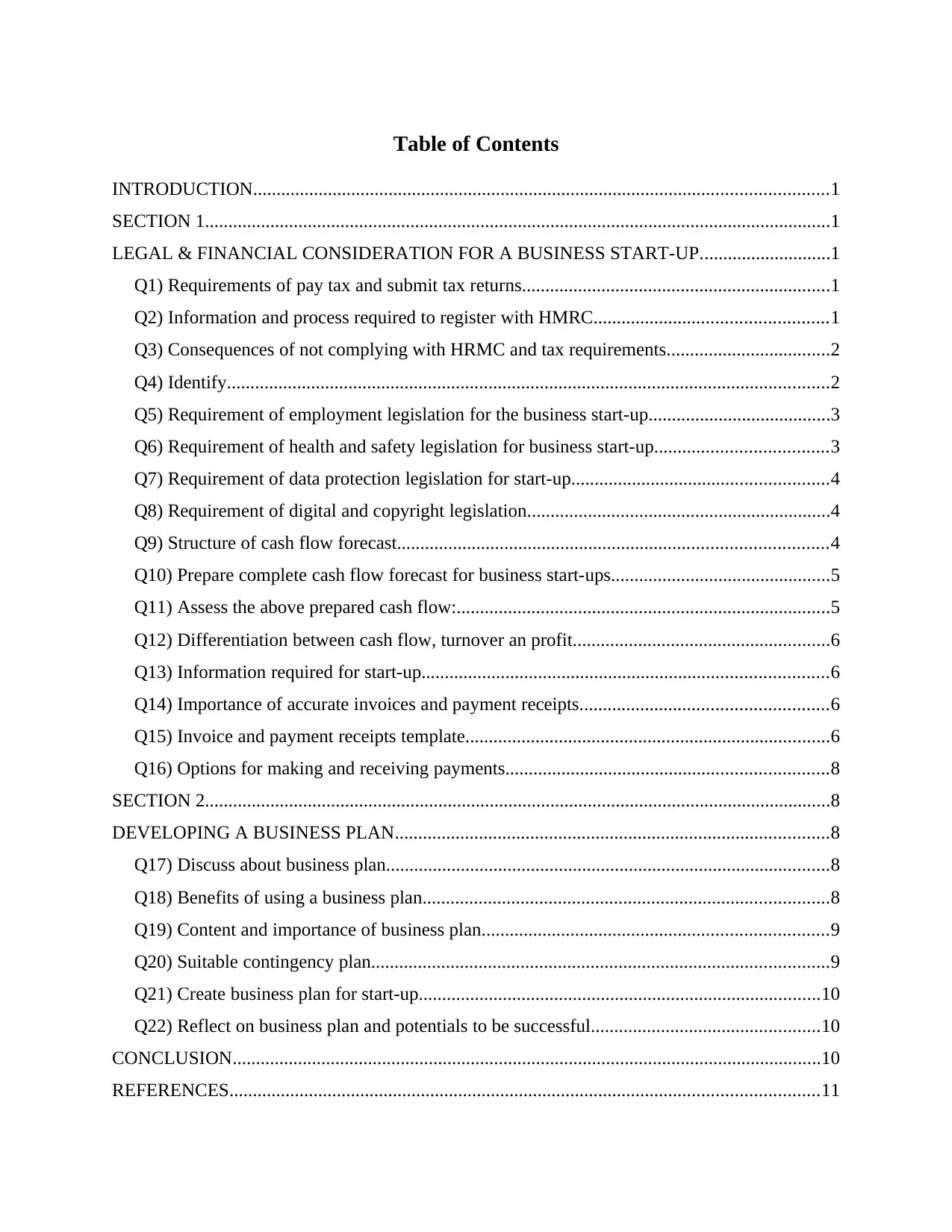
Table of Contents
INTRODUCTION...........................................................................................................................1
SECTION 1......................................................................................................................................1
LEGAL & FINANCIAL CONSIDERATION FOR A BUSINESS START-UP............................1
Q1) Requirements of pay tax and submit tax returns..................................................................1
Q2) Information and process required to register with HMRC..................................................1
Q3) Consequences of not complying with HRMC and tax requirements...................................2
Q4) Identify.................................................................................................................................2
Q5) Requirement of employment legislation for the business start-up.......................................3
Q6) Requirement of health and safety legislation for business start-up.....................................3
Q7) Requirement of data protection legislation for start-up.......................................................4
Q8) Requirement of digital and copyright legislation.................................................................4
Q9) Structure of cash flow forecast............................................................................................4
Q10) Prepare complete cash flow forecast for business start-ups...............................................5
Q11) Assess the above prepared cash flow:................................................................................5
Q12) Differentiation between cash flow, turnover an profit.......................................................6
Q13) Information required for start-up.......................................................................................6
Q14) Importance of accurate invoices and payment receipts.....................................................6
Q15) Invoice and payment receipts template..............................................................................6
Q16) Options for making and receiving payments.....................................................................8
SECTION 2......................................................................................................................................8
DEVELOPING A BUSINESS PLAN.............................................................................................8
Q17) Discuss about business plan...............................................................................................8
Q18) Benefits of using a business plan.......................................................................................8
Q19) Content and importance of business plan..........................................................................9
Q20) Suitable contingency plan..................................................................................................9
Q21) Create business plan for start-up......................................................................................10
Q22) Reflect on business plan and potentials to be successful.................................................10
CONCLUSION..............................................................................................................................10
REFERENCES..............................................................................................................................11
INTRODUCTION...........................................................................................................................1
SECTION 1......................................................................................................................................1
LEGAL & FINANCIAL CONSIDERATION FOR A BUSINESS START-UP............................1
Q1) Requirements of pay tax and submit tax returns..................................................................1
Q2) Information and process required to register with HMRC..................................................1
Q3) Consequences of not complying with HRMC and tax requirements...................................2
Q4) Identify.................................................................................................................................2
Q5) Requirement of employment legislation for the business start-up.......................................3
Q6) Requirement of health and safety legislation for business start-up.....................................3
Q7) Requirement of data protection legislation for start-up.......................................................4
Q8) Requirement of digital and copyright legislation.................................................................4
Q9) Structure of cash flow forecast............................................................................................4
Q10) Prepare complete cash flow forecast for business start-ups...............................................5
Q11) Assess the above prepared cash flow:................................................................................5
Q12) Differentiation between cash flow, turnover an profit.......................................................6
Q13) Information required for start-up.......................................................................................6
Q14) Importance of accurate invoices and payment receipts.....................................................6
Q15) Invoice and payment receipts template..............................................................................6
Q16) Options for making and receiving payments.....................................................................8
SECTION 2......................................................................................................................................8
DEVELOPING A BUSINESS PLAN.............................................................................................8
Q17) Discuss about business plan...............................................................................................8
Q18) Benefits of using a business plan.......................................................................................8
Q19) Content and importance of business plan..........................................................................9
Q20) Suitable contingency plan..................................................................................................9
Q21) Create business plan for start-up......................................................................................10
Q22) Reflect on business plan and potentials to be successful.................................................10
CONCLUSION..............................................................................................................................10
REFERENCES..............................................................................................................................11

⊘ This is a preview!⊘
Do you want full access?
Subscribe today to unlock all pages.

Trusted by 1+ million students worldwide
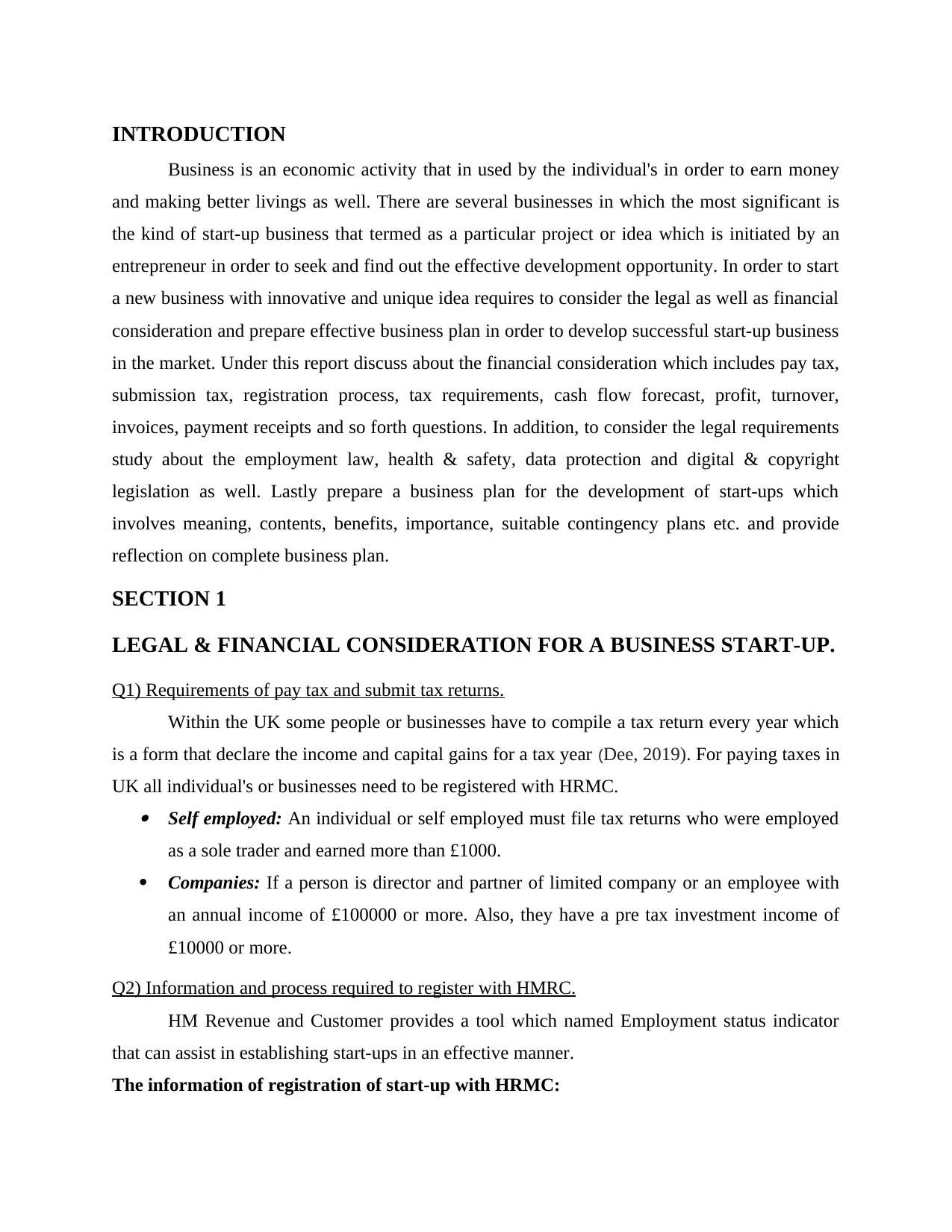
INTRODUCTION
Business is an economic activity that in used by the individual's in order to earn money
and making better livings as well. There are several businesses in which the most significant is
the kind of start-up business that termed as a particular project or idea which is initiated by an
entrepreneur in order to seek and find out the effective development opportunity. In order to start
a new business with innovative and unique idea requires to consider the legal as well as financial
consideration and prepare effective business plan in order to develop successful start-up business
in the market. Under this report discuss about the financial consideration which includes pay tax,
submission tax, registration process, tax requirements, cash flow forecast, profit, turnover,
invoices, payment receipts and so forth questions. In addition, to consider the legal requirements
study about the employment law, health & safety, data protection and digital & copyright
legislation as well. Lastly prepare a business plan for the development of start-ups which
involves meaning, contents, benefits, importance, suitable contingency plans etc. and provide
reflection on complete business plan.
SECTION 1
LEGAL & FINANCIAL CONSIDERATION FOR A BUSINESS START-UP.
Q1) Requirements of pay tax and submit tax returns.
Within the UK some people or businesses have to compile a tax return every year which
is a form that declare the income and capital gains for a tax year (Dee, 2019). For paying taxes in
UK all individual's or businesses need to be registered with HRMC. Self employed: An individual or self employed must file tax returns who were employed
as a sole trader and earned more than £1000.
Companies: If a person is director and partner of limited company or an employee with
an annual income of £100000 or more. Also, they have a pre tax investment income of
£10000 or more.
Q2) Information and process required to register with HMRC.
HM Revenue and Customer provides a tool which named Employment status indicator
that can assist in establishing start-ups in an effective manner.
The information of registration of start-up with HRMC:
Business is an economic activity that in used by the individual's in order to earn money
and making better livings as well. There are several businesses in which the most significant is
the kind of start-up business that termed as a particular project or idea which is initiated by an
entrepreneur in order to seek and find out the effective development opportunity. In order to start
a new business with innovative and unique idea requires to consider the legal as well as financial
consideration and prepare effective business plan in order to develop successful start-up business
in the market. Under this report discuss about the financial consideration which includes pay tax,
submission tax, registration process, tax requirements, cash flow forecast, profit, turnover,
invoices, payment receipts and so forth questions. In addition, to consider the legal requirements
study about the employment law, health & safety, data protection and digital & copyright
legislation as well. Lastly prepare a business plan for the development of start-ups which
involves meaning, contents, benefits, importance, suitable contingency plans etc. and provide
reflection on complete business plan.
SECTION 1
LEGAL & FINANCIAL CONSIDERATION FOR A BUSINESS START-UP.
Q1) Requirements of pay tax and submit tax returns.
Within the UK some people or businesses have to compile a tax return every year which
is a form that declare the income and capital gains for a tax year (Dee, 2019). For paying taxes in
UK all individual's or businesses need to be registered with HRMC. Self employed: An individual or self employed must file tax returns who were employed
as a sole trader and earned more than £1000.
Companies: If a person is director and partner of limited company or an employee with
an annual income of £100000 or more. Also, they have a pre tax investment income of
£10000 or more.
Q2) Information and process required to register with HMRC.
HM Revenue and Customer provides a tool which named Employment status indicator
that can assist in establishing start-ups in an effective manner.
The information of registration of start-up with HRMC:
Paraphrase This Document
Need a fresh take? Get an instant paraphrase of this document with our AI Paraphraser
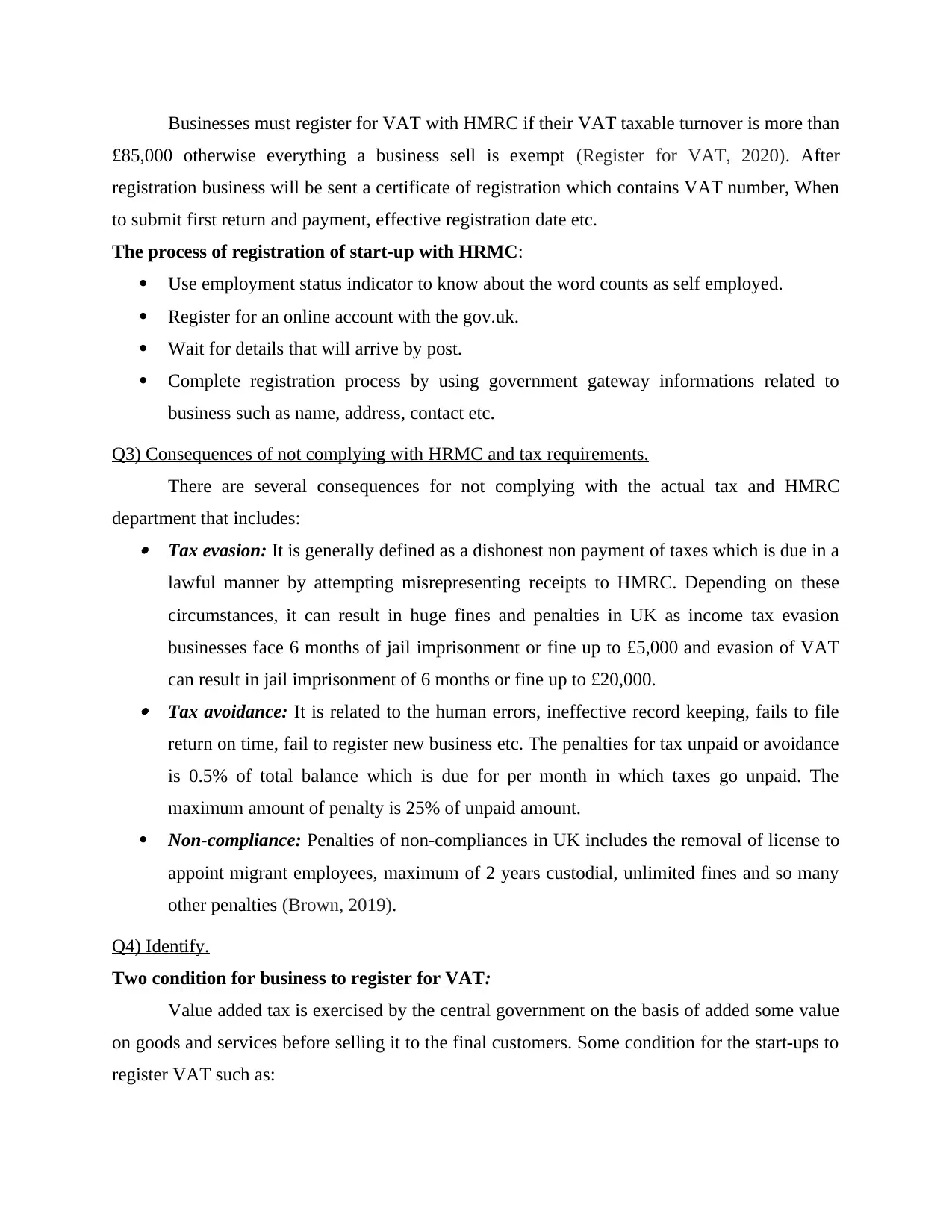
Businesses must register for VAT with HMRC if their VAT taxable turnover is more than
£85,000 otherwise everything a business sell is exempt (Register for VAT, 2020). After
registration business will be sent a certificate of registration which contains VAT number, When
to submit first return and payment, effective registration date etc.
The process of registration of start-up with HRMC:
Use employment status indicator to know about the word counts as self employed.
Register for an online account with the gov.uk.
Wait for details that will arrive by post.
Complete registration process by using government gateway informations related to
business such as name, address, contact etc.
Q3) Consequences of not complying with HRMC and tax requirements.
There are several consequences for not complying with the actual tax and HMRC
department that includes: Tax evasion: It is generally defined as a dishonest non payment of taxes which is due in a
lawful manner by attempting misrepresenting receipts to HMRC. Depending on these
circumstances, it can result in huge fines and penalties in UK as income tax evasion
businesses face 6 months of jail imprisonment or fine up to £5,000 and evasion of VAT
can result in jail imprisonment of 6 months or fine up to £20,000. Tax avoidance: It is related to the human errors, ineffective record keeping, fails to file
return on time, fail to register new business etc. The penalties for tax unpaid or avoidance
is 0.5% of total balance which is due for per month in which taxes go unpaid. The
maximum amount of penalty is 25% of unpaid amount.
Non-compliance: Penalties of non-compliances in UK includes the removal of license to
appoint migrant employees, maximum of 2 years custodial, unlimited fines and so many
other penalties (Brown, 2019).
Q4) Identify.
Two condition for business to register for VAT:
Value added tax is exercised by the central government on the basis of added some value
on goods and services before selling it to the final customers. Some condition for the start-ups to
register VAT such as:
£85,000 otherwise everything a business sell is exempt (Register for VAT, 2020). After
registration business will be sent a certificate of registration which contains VAT number, When
to submit first return and payment, effective registration date etc.
The process of registration of start-up with HRMC:
Use employment status indicator to know about the word counts as self employed.
Register for an online account with the gov.uk.
Wait for details that will arrive by post.
Complete registration process by using government gateway informations related to
business such as name, address, contact etc.
Q3) Consequences of not complying with HRMC and tax requirements.
There are several consequences for not complying with the actual tax and HMRC
department that includes: Tax evasion: It is generally defined as a dishonest non payment of taxes which is due in a
lawful manner by attempting misrepresenting receipts to HMRC. Depending on these
circumstances, it can result in huge fines and penalties in UK as income tax evasion
businesses face 6 months of jail imprisonment or fine up to £5,000 and evasion of VAT
can result in jail imprisonment of 6 months or fine up to £20,000. Tax avoidance: It is related to the human errors, ineffective record keeping, fails to file
return on time, fail to register new business etc. The penalties for tax unpaid or avoidance
is 0.5% of total balance which is due for per month in which taxes go unpaid. The
maximum amount of penalty is 25% of unpaid amount.
Non-compliance: Penalties of non-compliances in UK includes the removal of license to
appoint migrant employees, maximum of 2 years custodial, unlimited fines and so many
other penalties (Brown, 2019).
Q4) Identify.
Two condition for business to register for VAT:
Value added tax is exercised by the central government on the basis of added some value
on goods and services before selling it to the final customers. Some condition for the start-ups to
register VAT such as:
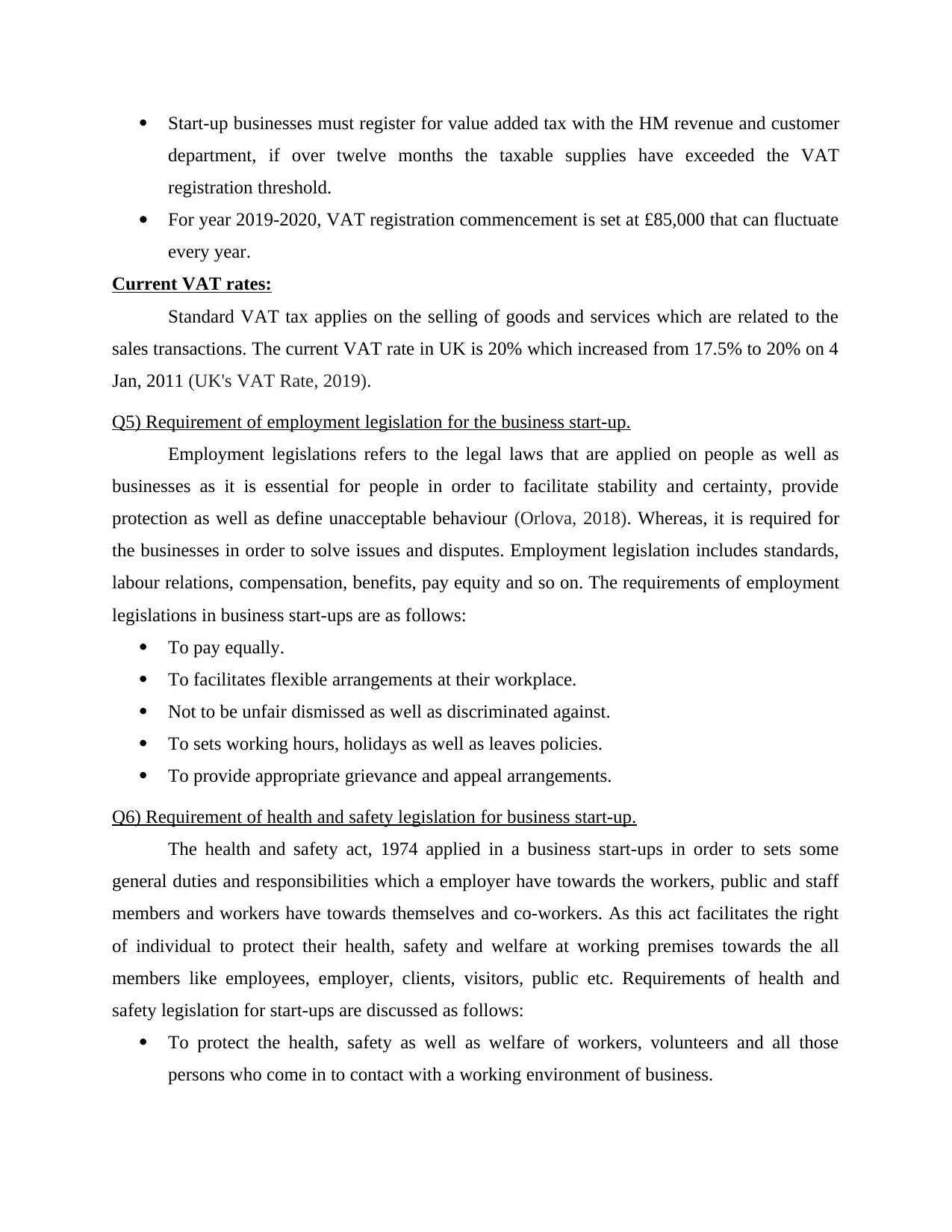
Start-up businesses must register for value added tax with the HM revenue and customer
department, if over twelve months the taxable supplies have exceeded the VAT
registration threshold.
For year 2019-2020, VAT registration commencement is set at £85,000 that can fluctuate
every year.
Current VAT rates:
Standard VAT tax applies on the selling of goods and services which are related to the
sales transactions. The current VAT rate in UK is 20% which increased from 17.5% to 20% on 4
Jan, 2011 (UK's VAT Rate, 2019).
Q5) Requirement of employment legislation for the business start-up.
Employment legislations refers to the legal laws that are applied on people as well as
businesses as it is essential for people in order to facilitate stability and certainty, provide
protection as well as define unacceptable behaviour (Orlova, 2018). Whereas, it is required for
the businesses in order to solve issues and disputes. Employment legislation includes standards,
labour relations, compensation, benefits, pay equity and so on. The requirements of employment
legislations in business start-ups are as follows:
To pay equally.
To facilitates flexible arrangements at their workplace.
Not to be unfair dismissed as well as discriminated against.
To sets working hours, holidays as well as leaves policies.
To provide appropriate grievance and appeal arrangements.
Q6) Requirement of health and safety legislation for business start-up.
The health and safety act, 1974 applied in a business start-ups in order to sets some
general duties and responsibilities which a employer have towards the workers, public and staff
members and workers have towards themselves and co-workers. As this act facilitates the right
of individual to protect their health, safety and welfare at working premises towards the all
members like employees, employer, clients, visitors, public etc. Requirements of health and
safety legislation for start-ups are discussed as follows:
To protect the health, safety as well as welfare of workers, volunteers and all those
persons who come in to contact with a working environment of business.
department, if over twelve months the taxable supplies have exceeded the VAT
registration threshold.
For year 2019-2020, VAT registration commencement is set at £85,000 that can fluctuate
every year.
Current VAT rates:
Standard VAT tax applies on the selling of goods and services which are related to the
sales transactions. The current VAT rate in UK is 20% which increased from 17.5% to 20% on 4
Jan, 2011 (UK's VAT Rate, 2019).
Q5) Requirement of employment legislation for the business start-up.
Employment legislations refers to the legal laws that are applied on people as well as
businesses as it is essential for people in order to facilitate stability and certainty, provide
protection as well as define unacceptable behaviour (Orlova, 2018). Whereas, it is required for
the businesses in order to solve issues and disputes. Employment legislation includes standards,
labour relations, compensation, benefits, pay equity and so on. The requirements of employment
legislations in business start-ups are as follows:
To pay equally.
To facilitates flexible arrangements at their workplace.
Not to be unfair dismissed as well as discriminated against.
To sets working hours, holidays as well as leaves policies.
To provide appropriate grievance and appeal arrangements.
Q6) Requirement of health and safety legislation for business start-up.
The health and safety act, 1974 applied in a business start-ups in order to sets some
general duties and responsibilities which a employer have towards the workers, public and staff
members and workers have towards themselves and co-workers. As this act facilitates the right
of individual to protect their health, safety and welfare at working premises towards the all
members like employees, employer, clients, visitors, public etc. Requirements of health and
safety legislation for start-ups are discussed as follows:
To protect the health, safety as well as welfare of workers, volunteers and all those
persons who come in to contact with a working environment of business.
⊘ This is a preview!⊘
Do you want full access?
Subscribe today to unlock all pages.

Trusted by 1+ million students worldwide
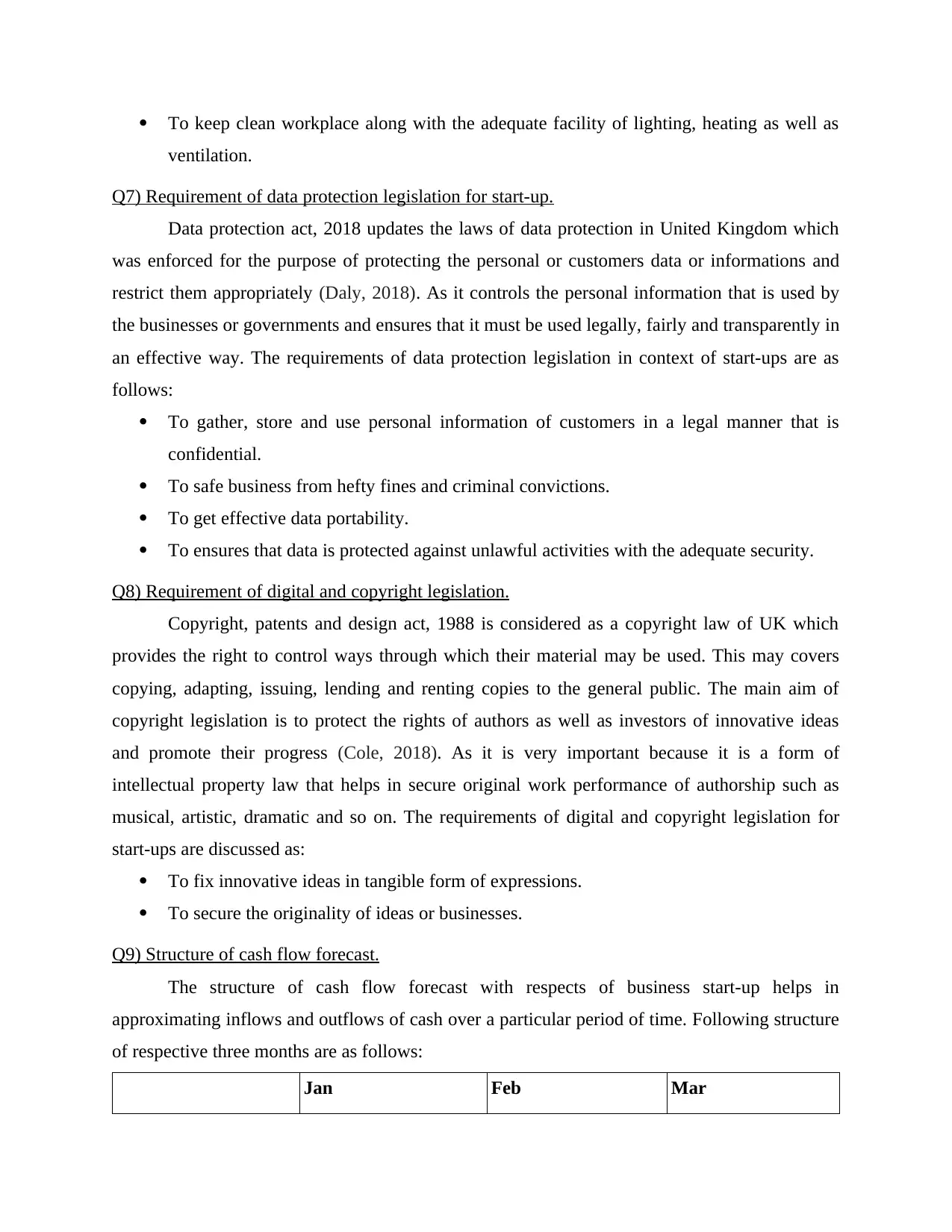
To keep clean workplace along with the adequate facility of lighting, heating as well as
ventilation.
Q7) Requirement of data protection legislation for start-up.
Data protection act, 2018 updates the laws of data protection in United Kingdom which
was enforced for the purpose of protecting the personal or customers data or informations and
restrict them appropriately (Daly, 2018). As it controls the personal information that is used by
the businesses or governments and ensures that it must be used legally, fairly and transparently in
an effective way. The requirements of data protection legislation in context of start-ups are as
follows:
To gather, store and use personal information of customers in a legal manner that is
confidential.
To safe business from hefty fines and criminal convictions.
To get effective data portability.
To ensures that data is protected against unlawful activities with the adequate security.
Q8) Requirement of digital and copyright legislation.
Copyright, patents and design act, 1988 is considered as a copyright law of UK which
provides the right to control ways through which their material may be used. This may covers
copying, adapting, issuing, lending and renting copies to the general public. The main aim of
copyright legislation is to protect the rights of authors as well as investors of innovative ideas
and promote their progress (Cole, 2018). As it is very important because it is a form of
intellectual property law that helps in secure original work performance of authorship such as
musical, artistic, dramatic and so on. The requirements of digital and copyright legislation for
start-ups are discussed as:
To fix innovative ideas in tangible form of expressions.
To secure the originality of ideas or businesses.
Q9) Structure of cash flow forecast.
The structure of cash flow forecast with respects of business start-up helps in
approximating inflows and outflows of cash over a particular period of time. Following structure
of respective three months are as follows:
Jan Feb Mar
ventilation.
Q7) Requirement of data protection legislation for start-up.
Data protection act, 2018 updates the laws of data protection in United Kingdom which
was enforced for the purpose of protecting the personal or customers data or informations and
restrict them appropriately (Daly, 2018). As it controls the personal information that is used by
the businesses or governments and ensures that it must be used legally, fairly and transparently in
an effective way. The requirements of data protection legislation in context of start-ups are as
follows:
To gather, store and use personal information of customers in a legal manner that is
confidential.
To safe business from hefty fines and criminal convictions.
To get effective data portability.
To ensures that data is protected against unlawful activities with the adequate security.
Q8) Requirement of digital and copyright legislation.
Copyright, patents and design act, 1988 is considered as a copyright law of UK which
provides the right to control ways through which their material may be used. This may covers
copying, adapting, issuing, lending and renting copies to the general public. The main aim of
copyright legislation is to protect the rights of authors as well as investors of innovative ideas
and promote their progress (Cole, 2018). As it is very important because it is a form of
intellectual property law that helps in secure original work performance of authorship such as
musical, artistic, dramatic and so on. The requirements of digital and copyright legislation for
start-ups are discussed as:
To fix innovative ideas in tangible form of expressions.
To secure the originality of ideas or businesses.
Q9) Structure of cash flow forecast.
The structure of cash flow forecast with respects of business start-up helps in
approximating inflows and outflows of cash over a particular period of time. Following structure
of respective three months are as follows:
Jan Feb Mar
Paraphrase This Document
Need a fresh take? Get an instant paraphrase of this document with our AI Paraphraser
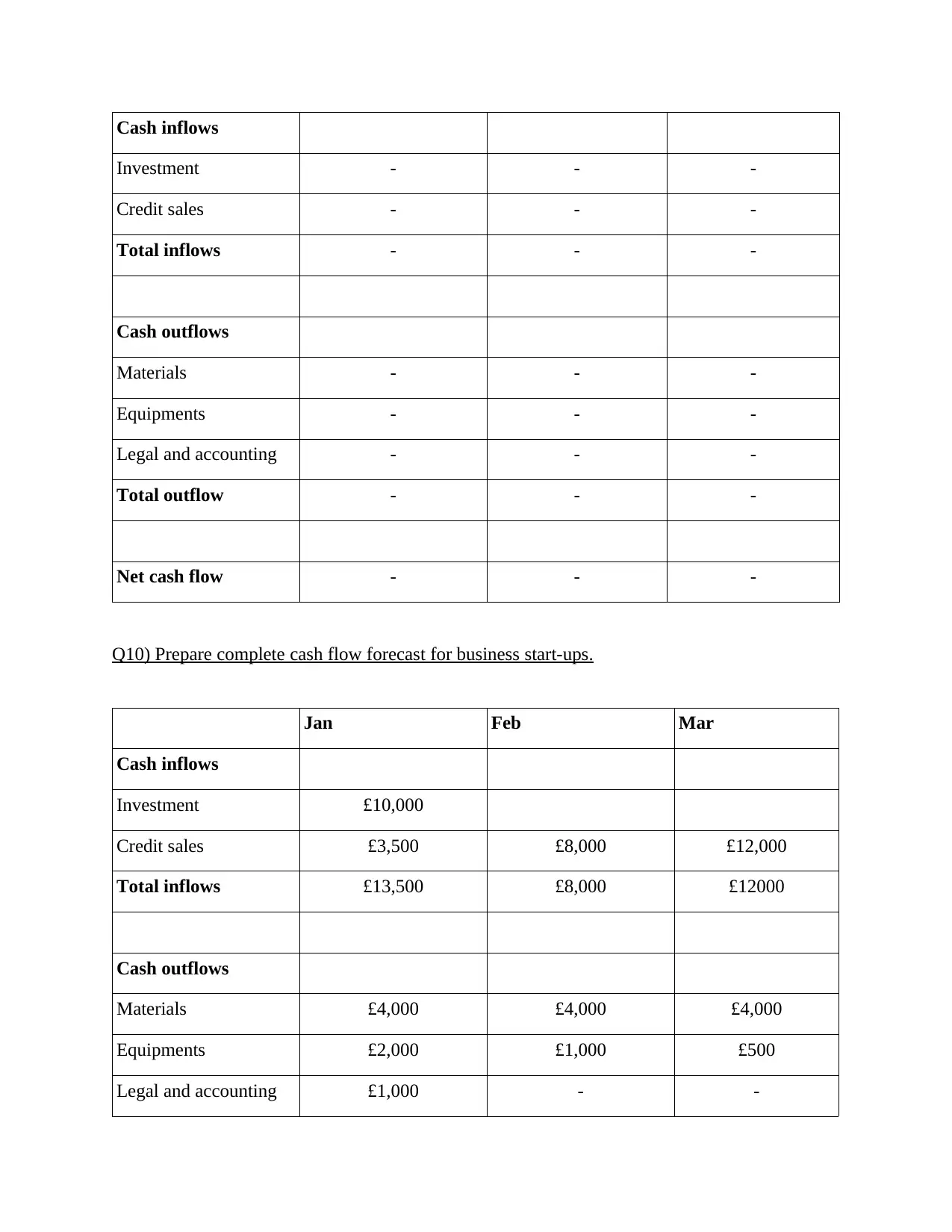
Cash inflows
Investment - - -
Credit sales - - -
Total inflows - - -
Cash outflows
Materials - - -
Equipments - - -
Legal and accounting - - -
Total outflow - - -
Net cash flow - - -
Q10) Prepare complete cash flow forecast for business start-ups.
Jan Feb Mar
Cash inflows
Investment £10,000
Credit sales £3,500 £8,000 £12,000
Total inflows £13,500 £8,000 £12000
Cash outflows
Materials £4,000 £4,000 £4,000
Equipments £2,000 £1,000 £500
Legal and accounting £1,000 - -
Investment - - -
Credit sales - - -
Total inflows - - -
Cash outflows
Materials - - -
Equipments - - -
Legal and accounting - - -
Total outflow - - -
Net cash flow - - -
Q10) Prepare complete cash flow forecast for business start-ups.
Jan Feb Mar
Cash inflows
Investment £10,000
Credit sales £3,500 £8,000 £12,000
Total inflows £13,500 £8,000 £12000
Cash outflows
Materials £4,000 £4,000 £4,000
Equipments £2,000 £1,000 £500
Legal and accounting £1,000 - -
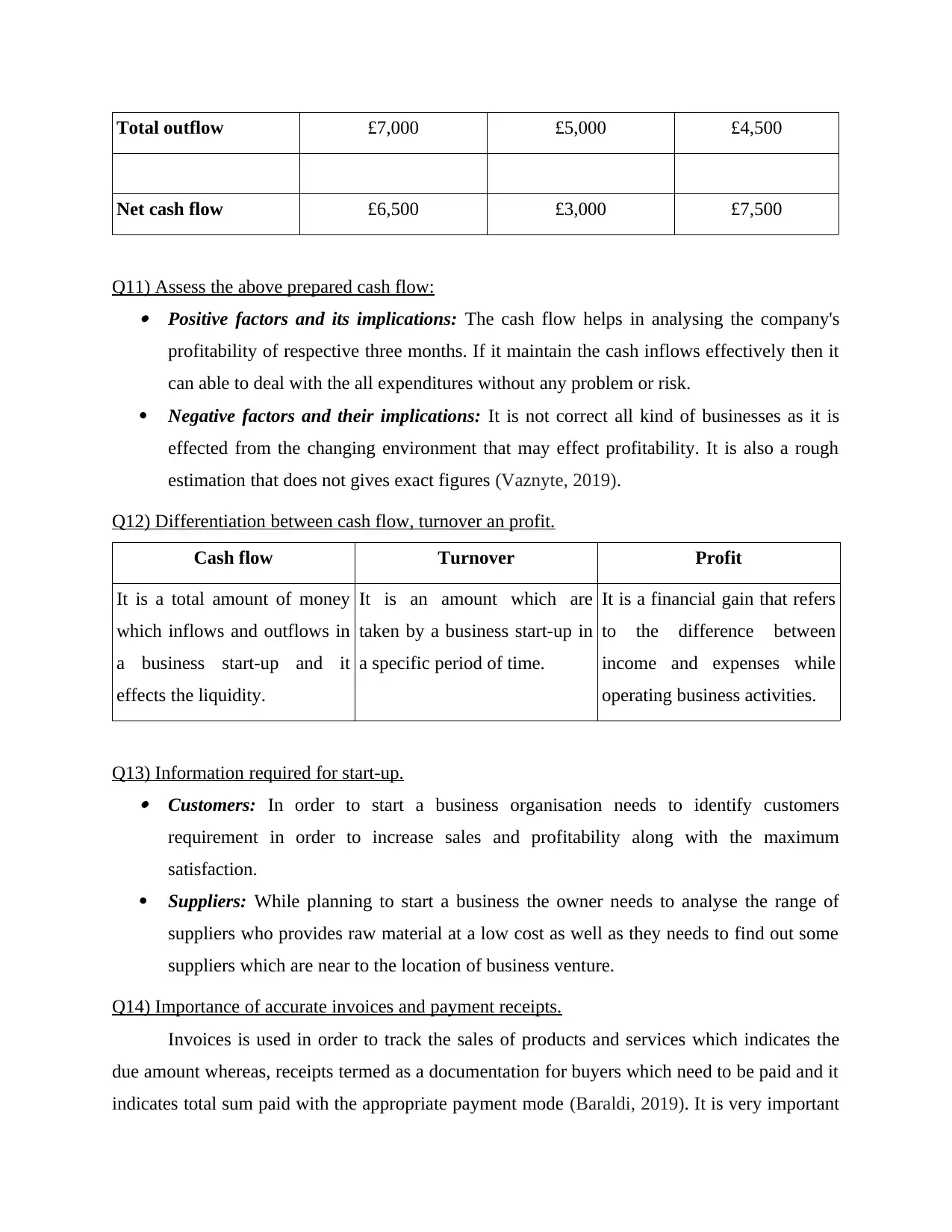
Total outflow £7,000 £5,000 £4,500
Net cash flow £6,500 £3,000 £7,500
Q11) Assess the above prepared cash flow: Positive factors and its implications: The cash flow helps in analysing the company's
profitability of respective three months. If it maintain the cash inflows effectively then it
can able to deal with the all expenditures without any problem or risk.
Negative factors and their implications: It is not correct all kind of businesses as it is
effected from the changing environment that may effect profitability. It is also a rough
estimation that does not gives exact figures (Vaznyte, 2019).
Q12) Differentiation between cash flow, turnover an profit.
Cash flow Turnover Profit
It is a total amount of money
which inflows and outflows in
a business start-up and it
effects the liquidity.
It is an amount which are
taken by a business start-up in
a specific period of time.
It is a financial gain that refers
to the difference between
income and expenses while
operating business activities.
Q13) Information required for start-up. Customers: In order to start a business organisation needs to identify customers
requirement in order to increase sales and profitability along with the maximum
satisfaction.
Suppliers: While planning to start a business the owner needs to analyse the range of
suppliers who provides raw material at a low cost as well as they needs to find out some
suppliers which are near to the location of business venture.
Q14) Importance of accurate invoices and payment receipts.
Invoices is used in order to track the sales of products and services which indicates the
due amount whereas, receipts termed as a documentation for buyers which need to be paid and it
indicates total sum paid with the appropriate payment mode (Baraldi, 2019). It is very important
Net cash flow £6,500 £3,000 £7,500
Q11) Assess the above prepared cash flow: Positive factors and its implications: The cash flow helps in analysing the company's
profitability of respective three months. If it maintain the cash inflows effectively then it
can able to deal with the all expenditures without any problem or risk.
Negative factors and their implications: It is not correct all kind of businesses as it is
effected from the changing environment that may effect profitability. It is also a rough
estimation that does not gives exact figures (Vaznyte, 2019).
Q12) Differentiation between cash flow, turnover an profit.
Cash flow Turnover Profit
It is a total amount of money
which inflows and outflows in
a business start-up and it
effects the liquidity.
It is an amount which are
taken by a business start-up in
a specific period of time.
It is a financial gain that refers
to the difference between
income and expenses while
operating business activities.
Q13) Information required for start-up. Customers: In order to start a business organisation needs to identify customers
requirement in order to increase sales and profitability along with the maximum
satisfaction.
Suppliers: While planning to start a business the owner needs to analyse the range of
suppliers who provides raw material at a low cost as well as they needs to find out some
suppliers which are near to the location of business venture.
Q14) Importance of accurate invoices and payment receipts.
Invoices is used in order to track the sales of products and services which indicates the
due amount whereas, receipts termed as a documentation for buyers which need to be paid and it
indicates total sum paid with the appropriate payment mode (Baraldi, 2019). It is very important
⊘ This is a preview!⊘
Do you want full access?
Subscribe today to unlock all pages.

Trusted by 1+ million students worldwide
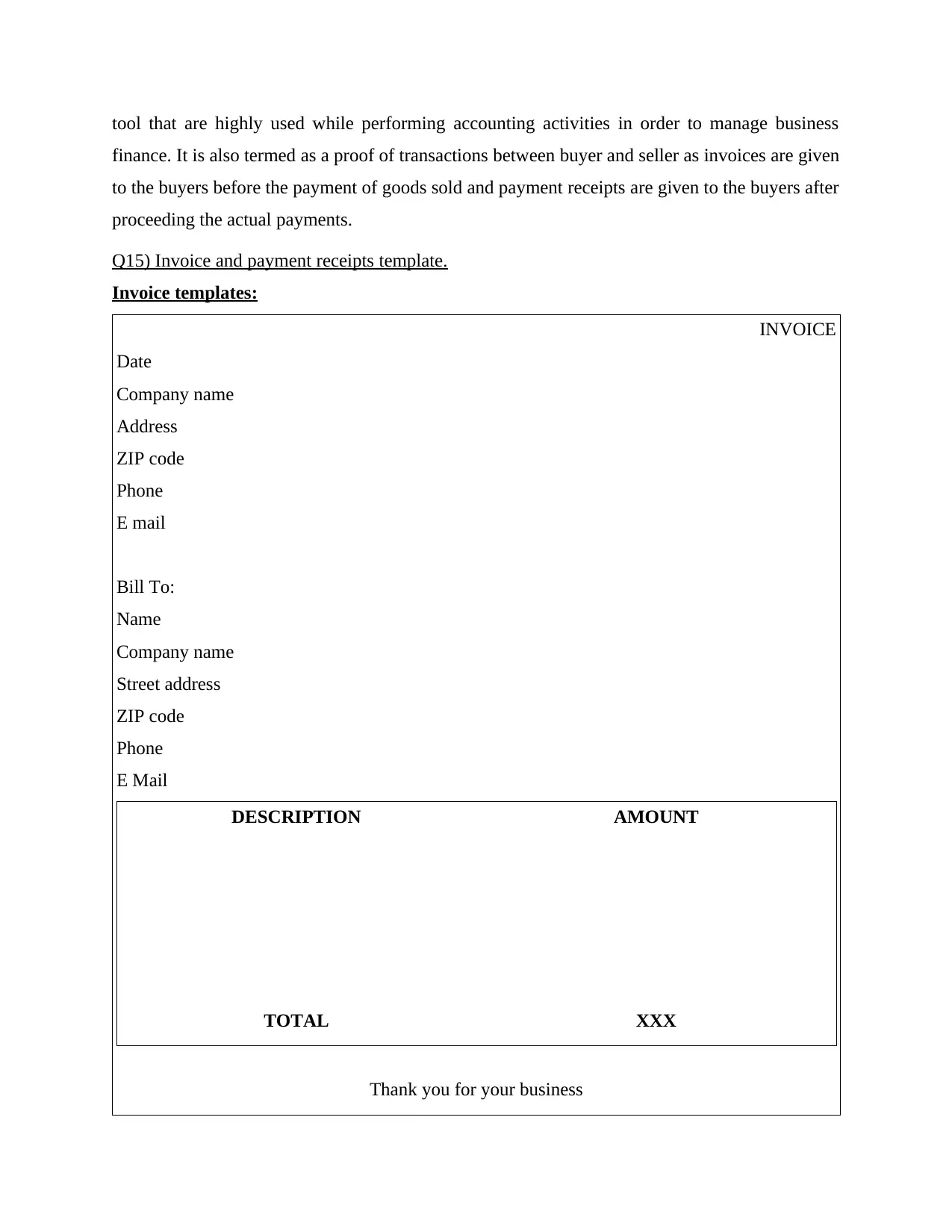
tool that are highly used while performing accounting activities in order to manage business
finance. It is also termed as a proof of transactions between buyer and seller as invoices are given
to the buyers before the payment of goods sold and payment receipts are given to the buyers after
proceeding the actual payments.
Q15) Invoice and payment receipts template.
Invoice templates:
INVOICE
Date
Company name
Address
ZIP code
Phone
E mail
Bill To:
Name
Company name
Street address
ZIP code
Phone
E Mail
DESCRIPTION AMOUNT
TOTAL XXX
Thank you for your business
finance. It is also termed as a proof of transactions between buyer and seller as invoices are given
to the buyers before the payment of goods sold and payment receipts are given to the buyers after
proceeding the actual payments.
Q15) Invoice and payment receipts template.
Invoice templates:
INVOICE
Date
Company name
Address
ZIP code
Phone
E mail
Bill To:
Name
Company name
Street address
ZIP code
Phone
E Mail
DESCRIPTION AMOUNT
TOTAL XXX
Thank you for your business
Paraphrase This Document
Need a fresh take? Get an instant paraphrase of this document with our AI Paraphraser
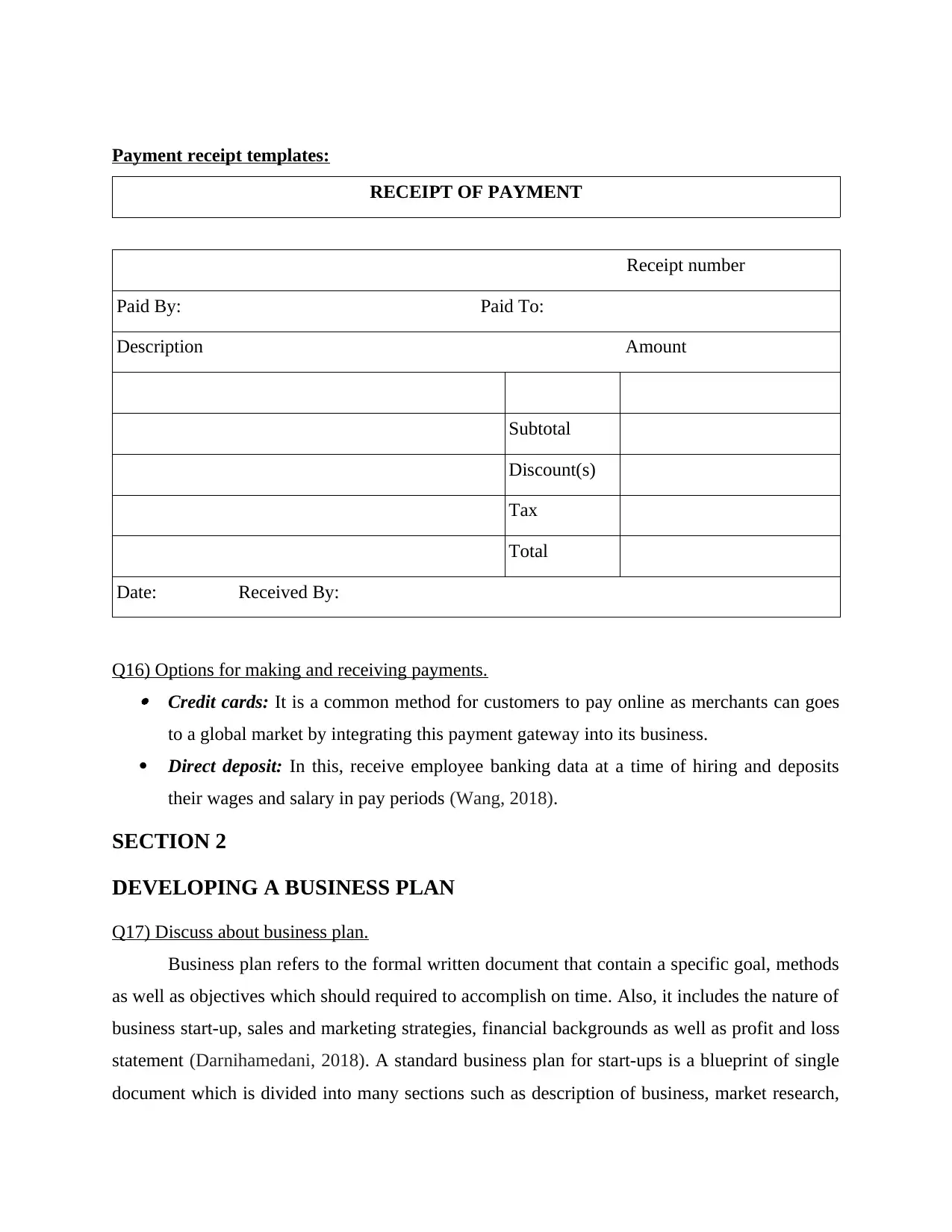
Payment receipt templates:
RECEIPT OF PAYMENT
Receipt number
Paid By: Paid To:
Description Amount
Subtotal
Discount(s)
Tax
Total
Date: Received By:
Q16) Options for making and receiving payments. Credit cards: It is a common method for customers to pay online as merchants can goes
to a global market by integrating this payment gateway into its business.
Direct deposit: In this, receive employee banking data at a time of hiring and deposits
their wages and salary in pay periods (Wang, 2018).
SECTION 2
DEVELOPING A BUSINESS PLAN
Q17) Discuss about business plan.
Business plan refers to the formal written document that contain a specific goal, methods
as well as objectives which should required to accomplish on time. Also, it includes the nature of
business start-up, sales and marketing strategies, financial backgrounds as well as profit and loss
statement (Darnihamedani, 2018). A standard business plan for start-ups is a blueprint of single
document which is divided into many sections such as description of business, market research,
RECEIPT OF PAYMENT
Receipt number
Paid By: Paid To:
Description Amount
Subtotal
Discount(s)
Tax
Total
Date: Received By:
Q16) Options for making and receiving payments. Credit cards: It is a common method for customers to pay online as merchants can goes
to a global market by integrating this payment gateway into its business.
Direct deposit: In this, receive employee banking data at a time of hiring and deposits
their wages and salary in pay periods (Wang, 2018).
SECTION 2
DEVELOPING A BUSINESS PLAN
Q17) Discuss about business plan.
Business plan refers to the formal written document that contain a specific goal, methods
as well as objectives which should required to accomplish on time. Also, it includes the nature of
business start-up, sales and marketing strategies, financial backgrounds as well as profit and loss
statement (Darnihamedani, 2018). A standard business plan for start-ups is a blueprint of single
document which is divided into many sections such as description of business, market research,
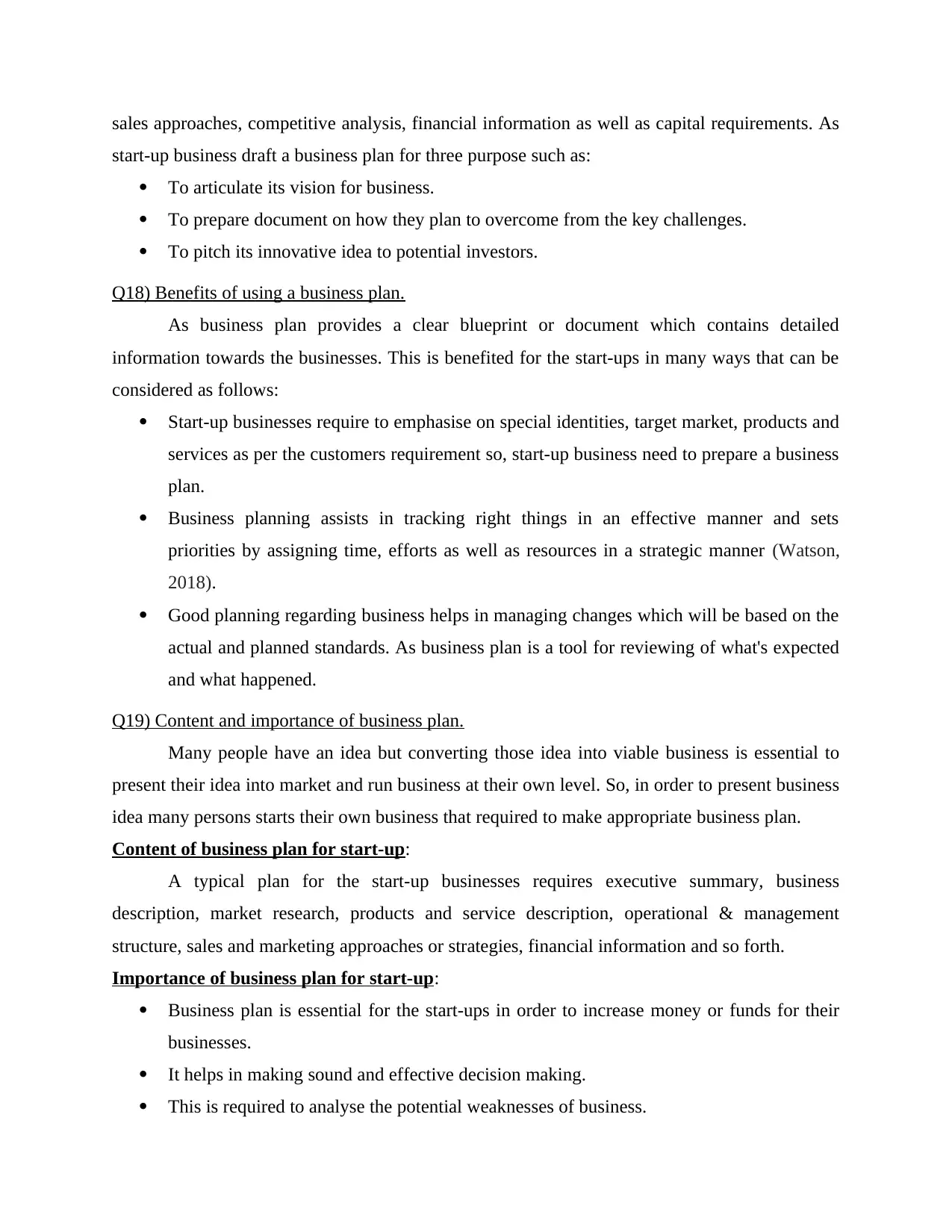
sales approaches, competitive analysis, financial information as well as capital requirements. As
start-up business draft a business plan for three purpose such as:
To articulate its vision for business.
To prepare document on how they plan to overcome from the key challenges.
To pitch its innovative idea to potential investors.
Q18) Benefits of using a business plan.
As business plan provides a clear blueprint or document which contains detailed
information towards the businesses. This is benefited for the start-ups in many ways that can be
considered as follows:
Start-up businesses require to emphasise on special identities, target market, products and
services as per the customers requirement so, start-up business need to prepare a business
plan.
Business planning assists in tracking right things in an effective manner and sets
priorities by assigning time, efforts as well as resources in a strategic manner (Watson,
2018).
Good planning regarding business helps in managing changes which will be based on the
actual and planned standards. As business plan is a tool for reviewing of what's expected
and what happened.
Q19) Content and importance of business plan.
Many people have an idea but converting those idea into viable business is essential to
present their idea into market and run business at their own level. So, in order to present business
idea many persons starts their own business that required to make appropriate business plan.
Content of business plan for start-up:
A typical plan for the start-up businesses requires executive summary, business
description, market research, products and service description, operational & management
structure, sales and marketing approaches or strategies, financial information and so forth.
Importance of business plan for start-up:
Business plan is essential for the start-ups in order to increase money or funds for their
businesses.
It helps in making sound and effective decision making.
This is required to analyse the potential weaknesses of business.
start-up business draft a business plan for three purpose such as:
To articulate its vision for business.
To prepare document on how they plan to overcome from the key challenges.
To pitch its innovative idea to potential investors.
Q18) Benefits of using a business plan.
As business plan provides a clear blueprint or document which contains detailed
information towards the businesses. This is benefited for the start-ups in many ways that can be
considered as follows:
Start-up businesses require to emphasise on special identities, target market, products and
services as per the customers requirement so, start-up business need to prepare a business
plan.
Business planning assists in tracking right things in an effective manner and sets
priorities by assigning time, efforts as well as resources in a strategic manner (Watson,
2018).
Good planning regarding business helps in managing changes which will be based on the
actual and planned standards. As business plan is a tool for reviewing of what's expected
and what happened.
Q19) Content and importance of business plan.
Many people have an idea but converting those idea into viable business is essential to
present their idea into market and run business at their own level. So, in order to present business
idea many persons starts their own business that required to make appropriate business plan.
Content of business plan for start-up:
A typical plan for the start-up businesses requires executive summary, business
description, market research, products and service description, operational & management
structure, sales and marketing approaches or strategies, financial information and so forth.
Importance of business plan for start-up:
Business plan is essential for the start-ups in order to increase money or funds for their
businesses.
It helps in making sound and effective decision making.
This is required to analyse the potential weaknesses of business.
⊘ This is a preview!⊘
Do you want full access?
Subscribe today to unlock all pages.

Trusted by 1+ million students worldwide
1 out of 15
Related Documents
Your All-in-One AI-Powered Toolkit for Academic Success.
+13062052269
info@desklib.com
Available 24*7 on WhatsApp / Email
![[object Object]](/_next/static/media/star-bottom.7253800d.svg)
Unlock your academic potential
Copyright © 2020–2025 A2Z Services. All Rights Reserved. Developed and managed by ZUCOL.





